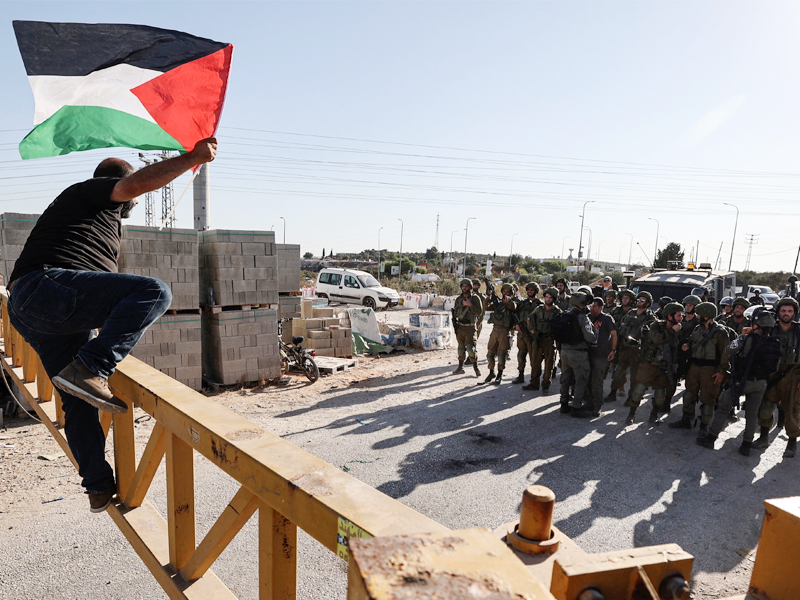Gaza must not be forgotten amid Israel’s latest controversies

- 230
- 0
In the tumult of the recent Israeli general election and the farcical process of forming a new government, the focus was chiefly on how it would affect Israeli democracy and relations with the Palestinians in the West Bank and East Jerusalem, while the Gaza Strip remained completely forgotten.
Alas, Gaza should not be forgotten, destined only to draw attention when rockets are launched or when hostilities with Israel flare up. The 2 million people who live there, under intolerable conditions of a cruel Israeli blockade and oppressive Hamas rule, should be on our minds, as they are living in what is probably the world’s largest open-air prison.
There are many facets to the Israeli blockade of Gaza that began in 2007 and, whatever qualms one has about Hamas, which controls the Strip, or Palestinian Islamic Jihad’s presence there, this cannot serve as a justification to deprive millions of human beings of their most basic human and civil rights. Not only are they blockaded by Israel, but they are also held as hostages as long as Hamas is in power and, who knows, maybe beyond.
This is not to excuse how Hamas rules its own people, but Israel’s brutal treatment of the Gazans cannot be justified by its ongoing conflict with this Islamist organization. Every single round of hostilities with Israel results in death, devastation and trauma, and in between these military acts of aggression the residents of Gaza are victimized because of the fraught relations between Israel and Hamas. According to a report by UNICEF, the escalation of August last year added thousands more children to the existing hundreds of thousands in need of mental and psychosocial support.
The economic situation is dire, with nearly half of the overall population unemployed. Unemployment is considerably worse among the youth, of whom two-thirds are without a job. It is no surprise, then, to learn that 60 percent of the population is living in poverty, with many suffering from food insecurity and only a small proportion having access to drinking water that meets the World Health Organization’s standards. This state of affairs, along with the appalling learning conditions in schools and the difficulties in accessing healthcare, is only kept above water by UNRWA and other sources of international aid.
The situation can very much be attributed to the blockade and its arbitrary practices, which are claimed to be for security reasons. There is very much an air of it being a ceaseless punishment of the Gazan population for electing Hamas in the first place and not toppling it in the subsequent years.
And yet, within the big picture of the Gazan people caught in this impossible and unjustifiable situation, there are also those senseless and cruel measures that are imposed by Israel that no security argument can justify. Instead, they are simply about controlling the population and demonstrating who is in complete control of their lives, livelihoods and well-being, even with no physical presence within the Gaza Strip.
One of these despicable measures is highlighted by the Israeli human rights organization Gisha in its new report, entitled “One-Way Ticket,” concerning a procedure that “forces Palestinian residents of the West Bank who are living in Gaza to effectively ‘waive’ their right to move back to the West Bank as a condition for submitting permit applications for humanitarian needs.” Israel, acting unilaterally, as it does habitually in its dealings with the Palestinians, registers West Bank residents separately from Gaza residents. It does not take much effort to unearth the ploy behind it, as Israel is deeply concerned with the demographic aspect of its conflict with the Palestinians. This was the thinking behind Israel’s disengagement from Gaza in 2005 and the reason why the two populations are dealt with separately, in complete disregard of its signed agreements with the Palestinians.
Demographically speaking, there is currently an equal number of Jews and Arabs within the boundaries of pre-1948 Mandatory Palestine between the Jordan River and the Mediterranean Sea. But considering the birth rate in both populations, it is only a matter of time - if it is not already the case - until a Jewish minority, which is mighty in military and economic terms but small in numbers, controls the Arab majority.
Hence, in the minds of Israel’s leaders, removing from this equation 2 million Palestinians who reside in the Gaza Strip, adding to them with residents of the West Bank and still controlling them from the outside, helps to ease the pressure on Israel to grant those under its direct and indirect occupation the right of self-determination, or any other rights that every human being is entitled to.
Such “innovative” ideas are typical of an occupying force that has absolute power, especially over people sometimes at their most vulnerable, who need to visit an ailing relative, who require medical treatment themselves or who want to participate in a family occasion.
Tania Hary, the executive director of Gisha and one of the most authoritative voices on the situation in the Gaza Strip, observed that, from her organization’s experience, “Israel exploited urgent, humanitarian requests to visit the West Bank to compel people to sign the form (that they are settled in Gaza), under pressure and intimidation, and then used this to claim that the person ‘waived’ their basic right to return to the West Bank in the future.” This is conducted, according to Hary, in contravention of international law and for all means and purposes is a forcible transfer, in “a grave breach (of international law) amounting to a war crime.”
The new Israeli government is in its infancy and there is no doubt that there are strong elements within it that treat the notions of human rights and humanitarianism, especially when it comes to the Palestinians, with scorn. Some among them are champing at the bit for a showdown with Hamas in Gaza, believing that it can be defeated militarily - such a move is bound to end with huge loss of life and an immeasurable humanitarian disaster.
In the meantime, the daily grind of the blockade continues. Its purpose is to wear down the Gazans, but all it is doing is stoking resentment and hatred toward those who inflict inhumane measures upon them, while in the long-term making coexistence and reconciliation between the two peoples, who are doomed to live together, increasingly difficult.
–Courtesy: Arab News
Published in The Daily National Courier, January, 11 2023
Like Business on Facebook, follow @DailyNCourier on Twitter to stay informed and join in the conversation.

















































